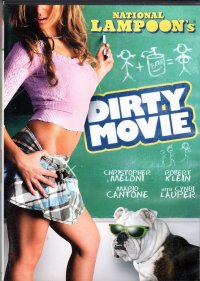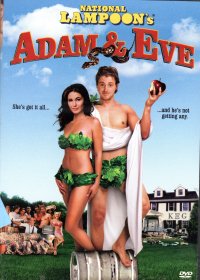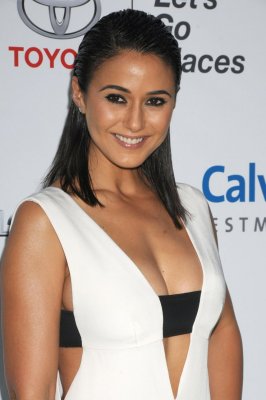Gentle reader, my wife and children are finding excuses to go to Silver Dollar City once or twice a week to get the most out of season passes, and as I am not an amusement park kind of guy–once a year is enough for me to walk around and maybe get onto the shoot-at-stuff ride (the Flooded Mine at Silver Dollar City), that means I get a chance to watch a couple of movies each week. Which is good, as I have a cabinet full of videocassettes, DVDs, and a Blu-Rays that I’ve been meaning to get to, and I’ve also started grabbing them with more frequency at garage sales and whatnot as I see their availability in such places coming to an end in a decade or so. Wow, that was quite a sentence.
Regardless, I bought and watched two National Lampoon-branded movies from the early part of the century this past week. I picked them up at a thrift store for a couple bucks each (the same trip where I bought My Cousin Vinny).
 National Lampoon’s Dirty Movie (2011)
National Lampoon’s Dirty Movie (2011)
When I got back from the thrift store, I made sure to show my purchases to my beautiful wife just in case my youngest (he of the I thought I’d find you in the Adult section infamy) saw some of the titles and told his mother I bought a Dirty Movie.
So. The movie is not a movie about a porn film a la Zack and Miri Make A Porno. Instead, it’s a meta film about making a film comprising nothing but dirty jokes being acted out. The frame story is a polyester producer who wants to make this film working with the studio, the director, writers, and actors to make the film interspersed with dirty and offensive jokes acted out. You have a bunch of clips with doctor, give me the good news/bad news jokes, Dirty Johnny jokes (a favorite of my father’s) where a schoolboy responds to a normal question with an off-color remark or pun, and that sort of thing. The comedy is full of ethnic humor and jokes at the expense of homosexuals, too, including some in the acted-out-joke portions and in the meta portion, where the writers insinuate that the director is gay. AND an extended bit where the producer wants to insert the baddest word but the head of the studio won’t allow it–and every time the writers, producer, and head of the studio say the baddest word, they bleep it out even though they’re using all manner of other ethnic slurs throughout the movie and in this bit in comparison (“So a bleeped baddest word can call a lesser ethnic slang, but not bleeped out a lesser ethnic slang, but not bleeped out, but a lesser ethnic slang, but not bleeped out cannot call a bleeped baddest word a bleeped baddest word?”) So it’s poking fun at the then-orthodoxy which has only gotten worse.
So it was amusing for people of a certain age who were not raised snowflakes, but it’s also not for young people, so if I ever make a locked cabinet for films to keep them out of the hands of my boys, this one will go in it. Although they’re teens now, so I only would need a locked cabinet for a little while yet, so I will probably not and just rely on their predilections for just staring at their other electronic devices and finding setting up the entertainment center to watch a movie on physical media too much of a chore to bother with.
 National Lampoon’s Adam and Eve (2005)
National Lampoon’s Adam and Eve (2005)
With the title Adam and Eve, one might expect some sort of Biblical story, and that’s not what this is at all. It has a standard setting for a National Lampoon film, a college, with main characters in a sorority and a fraternity (it says), and there’s a lot of drinking, sex, and drug use.
But at its core, this movie has a very, erm, conservative message. Adam introduces himself to the girl Eve, and they start dating, but she’s a virgin, and she’s not sure when she might want to go all the way. So most of the story deals with his frustration and her uncertainty, with pressure on Eve not only from Adam but also her sorority sisters. The gags are typical college movie fare, but the story isn’t about the gags. It’s about the tension and resolution in Adam and Eve’s relationship. Can they stay together without sex? They both declare their love for one another to each other and to others. An obvious plot twist and a satisfying conclusion.
So I was rather pleased with the film. But another one not for the boys.
In the film, Eve is played by Emmanuelle Chriqui, whom I recognized from You Don’t Mess with the Zohan but who also apparently has had a good career in television as well.



Given that National Lampoon’s Adam and Eve came out sixteen years ago, that would make Ms. Chriqui…. Well, not college aged any more, but you could fool me.
Here’s a clip where she answers as many questions as possible in 60 seconds so you can enjoy her sultry voice as well.
Neither of these films was widely successful, but I liked them both well enough to think maybe some 21st century comedies can appeal to me, so I am encouraged.
Oh, and in the interest of full disclosure, although how full is it since it’s way down here where you’re probably not reading any more–probably lingering on the photos above–I invested in National Lampoon (NLMP) back in the day, and I still hold it today. It’s lost most of its value, and I’ve taken a bath on it, so in your cynical heart you can think this post is an attempt to revitalize the brand and recoup my money. More likely it’s an insight into my investment strategy. I mean, I think it was Peter Lynch who said buy what you like. Maybe I should instead buy what other people like.



2 thoughts on “National Lampoon Movie Double Feature”
Comments are closed.